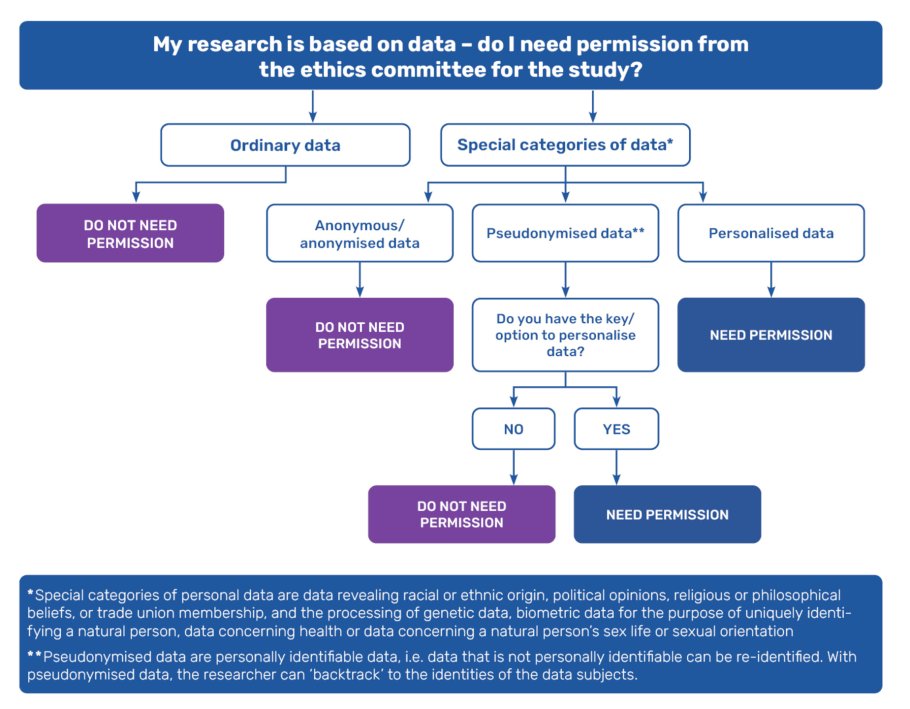Research ethics requirements in social sciences
The purpose of scientific research is the pursuit of true knowledge, and it is based on knowledge that the world can be made a better place. However, it is also important that the research itself is ethical – that it does not lead to unintended consequences for those being studied or for the researchers themselves. This is why it is necessary to consider whether a study meets research ethics requirements before starting any research.
On the one hand, research ethics requirements depend on the legal framework, but on the other, they are defined more specifically in a dialogue between researchers. We can say that the law sets a minimum standard, while researchers set higher standards.
The requirements of research ethics need to be specified keeping the discipline in mind. The requirements for research ethics in the social sciences and humanities are still evolving, and at the moment, there are no such specific requirements agreed upon at the national level in Estonia. Hopefully, they will soon be formulated more precisely. So far, ethics committees (e.g. the UT Research Ethics Committee) have a major role in ensuring compliance with the requirements of research ethics, and researchers planning certain studies must apply to them for permission before conducting a study. Therefore, the first question that arises for the researcher is whether the approval of an ethics committee is needed to start a study – perhaps an independent assessment of the ethical aspects of the planned study is enough? The guidelines prepared by the UT Research Ethics Committee regarding the section on ethical aspects of the research application (only in Estonian) may be helpful in this respect.
To answer these questions, the Faculty of Social Sciences offers some guidance. The guidelines below can help you to decide whether a research project (incl. a student paper) needs to be approved by an ethics committee. The guidelines concern only the obligations arising from the nature of the data, as laid down in the Personal Data Protection Act. It does not, therefore, cover all ethical principles and may not reflect the ethical requirements of a particular discipline or scientific journal, so permission from the research ethics committee may still be required even if it is not specified in the Personal Data Protection Act. If unsure how to proceed, please consult the faculty's research integrity counsellor or an ethics committee.
The legal basis for processing personal data may be (a) the informed consent of the data subject or (b) the law. Notably, the Personal Data Protection Act provides that personal data may be processed without the consent of the data subject for the needs of scientific and historical research and official statistic, in particular in a pseudonymised format or a format which provides equivalent level of protection (§ 6(1)). According to the Personal Data Protection Act, personal data can be divided into two categories – ordinary personal data and personal data of special categories. The Data Protection Inspectorate sometimes also distinguishes sensitive personal data (data posing a higher risk to privacy, which are strictly speaking not personal data of special categories. E.g. data on a person's financial difficulties, criminal record, etc.).
According to Article 9 (1) of the General Data Protection Regulation, special categories of personal data are data revealing racial or ethnic origin, political opinions, religious or philosophical beliefs, or trade union membership, and the processing of genetic data, biometric data for the purpose of uniquely identifying a natural person, data concerning health or data concerning a natural person's sex life or sexual orientation. The Personal Data Protection Act stipulates that if scientific and historical research is based on special categories of personal data, the ethics committee of the area concerned first verifies compliance with the terms and conditions provided for in the relevant section. The purpose of the permission of the ethics committee is to ensure further control over the lawful processing of personal data.
Thus, only special categories of data that are anonymous or anonymised (pseudonymised data for which we do not have the key to personalise) may be processed without the authorisation of the ethics committee. Special categories of personalised data (incl. pseudonymised data for which the researcher has the key to personalise) may not be processed without the authorisation of the ethics committee.
Permission from the ethics committee is required for all studies that process special categories of personal data that are or can be personalised (pseudonymised data for which we have the key to personalise). Asking for informed consent from the data subject does not exempt from the obligation to obtain the committee's permission.
Below, we have set out a decision tree to help you understand whether or not, based on the above, permission from the ethics committee is required for the study.

As indicated above, in addition to the requirements under the Personal Data Protection Act, studies can be subject to additional, higher ethical standards. For example, it is important to be aware that processing ordinary data (e.g. publicly available media texts, databases compiled from ordinary data) may also have unintended consequences for the researcher or the subject(s). The law does not require permission from the ethics committee for the processing of such data, but it is very important to consider the requirements of research ethics also in the case of ordinary data.
Also, when designing experimental studies, ethical standards must be considered to ensure there are no unintended consequences for the subjects. For example, if participation in a study is mentally or physically burdensome for the subjects, or if vulnerable persons or persons with restricted active legal capacity are involved, etc., it may also be necessary to obtain the approval of an ethics committee.
In case of questions or doubts, we recommend consulting the faculty's research integrity counsellor Prof. Kairi Kreegipuu.


